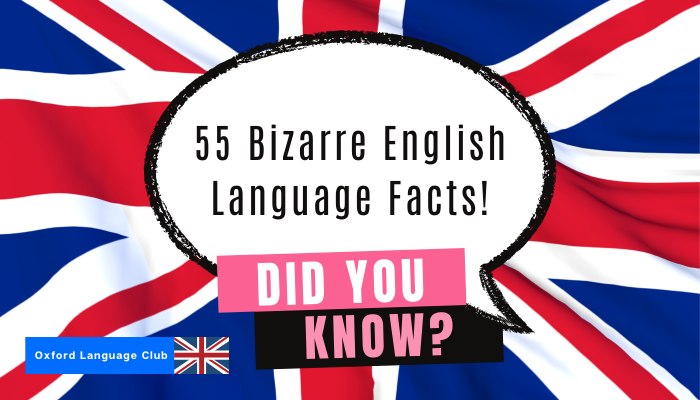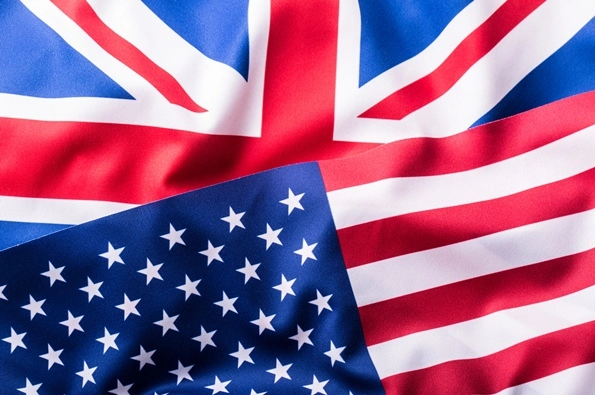


1. A pangram is a sentence that contains every letter in the language. For example, "The quick brown fox jumps over the lazy dog."
2. The term "lynch" is derived from the name of Colonel Charles Lynch (1736-96), a Virginia landowner who began to hold illegal trials in his backyard in 1790.
3. The shortest and oldest word in the English language is "I."
4. The word "oysterhood" means "reclusiveness" or "an overwhelming desire to stay at home."
5. An ambigram is a word that looks the same from various orientations. For example, the word "swims" will be the same even when turned upside down.
6. English is the official language for maritime and aeronautical communications.
7. English is the third most spoken native language in the world. Standard Chinese and Spanish are first and second, respectively.
8. If you wrote out all the numbers (e.g. one, two, three . . . ), you would not use the letter "b" until the word "billion."
9. The longest word in the English language is 45 letters long: "Pneumonoultramicroscopic-silicovolcanoconiosis." It is the scientific name for a type of lung disease.
10. Almost all of the 100 most frequently used words in English come from Old English. These words include, "a," "the," "and," pronouns, prepositions and conjunctions (from, with, when), and the various forms of the verbs "to have" and "to be."
11. The Oxford English Corpus contains over 2.5 billion words. The Oxford English Corpus is a collection of 21st-century texts and is used to track the way English changes over time.
12. Most average adult English speakers know between 20,000–35,000 words.
13. Words have a lifespan of anywhere between 1,000 and 20,000 years. More commonly used words tend to last longer.
14. Those who read fiction have a larger vocabulary than those who do not. Fiction usually contains a wider range of vocabulary than nonfiction does.
15. More people in the world have learned English as a second language than there are native English speakers.
16. Shakespeare added 1,700 words to the English language during his lifetime.
17. A new word is created every 98 minutes, which is about 14.7 words a day.
18. In 2018, approximately 1.53 billion people speak English as a primary, auxiliary, or business language. This is about 1 in 7 people on Earth.
19. The letter "e" is the most commonly used letter in the English language.
20. Only one word in all of English has the letters X, Y, and Z in order: Hydroxyzine. This unique word is a type of medicine that prevents sneezing and anxiety.
21. Though not commonly used, the day after tomorrow is called "overmorrow."
22. English is the most commonly used language in the sciences.
23. The 1066 Norman Conquest drastically changed the English language. When the Normans (French) conquered England, they brought with them thousands of French words associated with the church, court systems, and government, such as baron, noble, parliament, governor, banquet.
24. English is not the official language of the United States.
25. An anagram is a rearrangement of the letters in a word or phrase to form a different word or phrase. For example, the word "stifle" is an anagram of "itself."
26. The most complex word in the English language is "set." This small word has over 430 definitions and requires a 60,000 word definition that covers 24 pages in the Oxford English Dictionary.
27. There are only five words in the English language that consist of all vowels (aa, ae, ai, oe, and eau).
28.The word "queue" sounds the same even if the last four letters are removed. Before it meant "line," a queue meant the tail of a beast in medieval pictures and designs.
29. The longest common word with all the letters in alphabetical order is "almost."
30. More English words begin with the letter "s" than any other letter.
31. According to University of Warwick researchers, the top 10 funniest words in the English language are booty, tit, booby, hooter, nitwit, twit, waddle, tinkle, bebop, and egghead.
32. The word "good" has the most synonyms of any other word in the English language, at 380.
33. Yes, there is a word in English meaning "shapely buttocks." That word is "callipygian." It is from the Greek "kallipygos," meaning kallos (beauty) + pyge (buttocks).
34. The longest common word with no vowels is "rhythms."
35. The most commonly misused word in the English language is "ironic." Irony is often confused with sarcasm, coincidence, or paradox.
36. "Rhinorrhea" is the medical term for "runny nose."
37. The first number spelled out that contains an "a" is one thousand.
38. China has more English speakers than the United States.
39. The English words "moose," opossum," "pecan," "raccoon," "skunk," and "squash" originated from the now-extinct language of the Algonquian people. They were a native tribe that lived at the site of the earliest English colony on what is now Roanoke Island in the United States.
40. The opposite of "sparkle" is "darkle."
41. The word “whatever” consistently ranks as the most annoying English word.
42. The language that is most closely related to English is Frisian, a West Germanic language spoken in parts of the Netherlands and Germany.
43. The longest word you can make using only four letters is "senseless."
44. The word "good-bye" is a contraction of "God be with ye."
45. Capitonyms are words which change their meaning if the first letter is capitalized. For example: Turkey (the country) and turkey (the bird).
46. The most commonly used noun in the English language is the word "time."
47. The word "the" is the most commonly used English word overall, followed by "be," "to," "of," "and," "a," "in," "that," "have," and "I."
48. The plural of cul-de-sac is culs-de-sac.
49. The word "embox" means to "place something in a box."
50. The chess term “checkmate” is from a 14th-century Arabic phrase, “shah mat," meaning “the king is helpless.”
51. A "blatteroon" is a senseless blabber or boaster.[3]
52. An aptonym (or euonym) is a personal name that is appropriate to their job, such as Liz Potter, Katherine Barber, or Martin Shovel.
53. The ampersand used to be the 27th letter of the alphabet.
54. The synonym for the word synonym is poecilonym. It's from the Greek "poikilos" (various) + "-onym" (name).
55. Some English words exist only in plural form, such as binoculars, scissors, pants, and knickers.






















